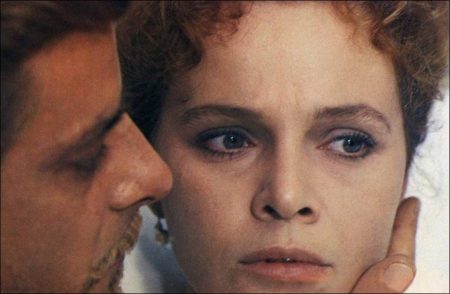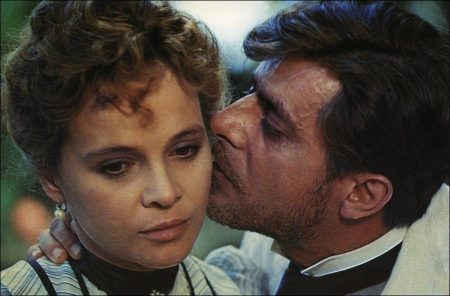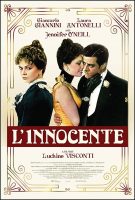The Innocent movie storyline. The story is set in the late nineteenth century. Tullio Hermil (Giancarlo Giannini), a wealthy Roman aristocrat married to Giuliana (Laura Antonelli), has a possessive aristocratic mistress (Jennifer O’Neill), Teresa Raffo, and neglects his wife.
His interest in his wife is rekindled when he sees Giuliana’s happiness after she has begun a love affair with a novelist, Filippo d’Arborio. She becomes pregnant by d’Arborio. Tullio urges an abortion but she refuses; d’Arborio then dies of a tropical infection.
Tullio cannot tolerate the healthy male child delivered to Giuliana, although he tries. While the family are at Christmas mass he exposes the baby and it dies, apparently of natural causes. Giuliana, who knows Tullio has murdered the baby, leaves him.
Tullio attempts to rekindle his affair with Teresa and takes her to his town house where they attempt to make love. When she tells him she no longer loves him, he shoots himself. Teresa picks up her belongings and leaves the estate.
The Innocent (Italian: L’innocente) was the last film made by Italian director Luchino Visconti. Released in 1976, the film is based on the novel The Intruder by Gabriele d’Annunzio. It was distributed in the United States by Analysis Film Releasing Corp.
The main shooting locations were the Villa Mirafiori in Rome, the Villa Butori in Lucca and the Villa Bellosguardo nearby. The soundtrack includes Wolfgang Amadeus Mozart’s Rondò Alla Turca and the aria Che farò senza Euridice from Christoph Willibald Gluck’s Orfeo ed Euridice.
Film Review for The Innocent
The late Luchino Visconti’s stately, sensual “L’Innocente,” freely adapted from an 1892 Gabriele D’Annunzio novel, proves to be a fitting and majestic finale to a remarkable career that embraced neorealism and period romanticism with a grand yet disciplined operatic style.
It was a visual style that at once expressed and resolved the director’s aristocratic background — he was in fact a count of ancient lineage — and his Marxist political leanings. It was Visconti’s special gift to be able to evoke privileged, often decadent worlds of great luxury and elegance just at the moment of their disintegration. The grand, fatal passions experienced by his people usually foreshadowed the larger historic and cataclysmic events about to overtake them.
This is especially true of “Senso” and “The Leopard,” both set against the time of the Risorgimento, and also of “L’Innocente,” which takes place at the height of La Belle Epoque, which was to be destroyed by World War I.
Giancarlo Giannini is a turn-of-the-century Roman aristocrat infatuated by his mistress (Jennifer O’Neill), a glamorous widow, and patronizing toward his wife (Laura Antonelli). However, O’Neill’s capriciousness and independence combine with the attraction Antonelli elicits in a young writer (Marc Porel) to rekindle Giannini’s passion for his wife. Just when he and his wife are experiencing ecstacies they have never known before, he learns from his mother (Rita Morelli) that his wife is pregnant. There is no way he could be the father.
The couple are then plunged into an emotional abyss, tormented by conflicted feelings of love and hatred. Their agony reflects the conventions and beliefs of their time and place, and for Visconti it is significant that they are members of that portion of Italian society most responsible for the rise of fascism.
Giannini’s miserable, jealous husband has been an avowed atheist and libertine, a man who attempts to disregard all that is held sacred in his world. Consequently, “L’Innocente” becomes a romantic tragedy, exquisitely modulated by Visconti and culminating on a note of horror (which Visconti effectively compounds in a departure from D’Annunzio).
As in all Visconti period pictures, “L’Innocente” has the most sumptuous settings and lavish costumes, designed by Mario Garbuglia and Piero Tosi, respectively, both distinguished, longtime Visconti collaborators. Pasqualino DeSantis’ camera gracefully captures all this incredible richness, and Franco Mannino’s score incorporates appropriately elegiac selections from Chopin, Mozart and Liszt.
“L’Innocente” is the kind of opulent, passionate drama that risks folly to attain the sublime. Giannini and Antonelli are equal to the challenge while O’Neill, who looks ravishing, provides a dispassionate counterpoint.
The Innocent (1976)
Directed by: Luchino Visconti
Starring: Giancarlo Giannini, Laura Antonelli, Jennifer O’Neill, Rina Morelli, Massimo Girotti, Marie Dubois, Roberta Paladini, Claude Mann, Marc Porel, Alessandra Vazzoler, Elvira Cortese
Screenplay by: Suso Cecchi d’Amico, Enrico Medioli, Luchino Visconti
Production Design by: Mario Garbuglia
Cinematography by: Pasqualino De Santis
Film Editing by: Ruggero Mastroianni
Costume Design by: Piero Tosi
Set Decoration by: Carlo Gervasi
Music by: Franco Mannino
MPAA Rating: None.
Distributed by: Analysis Film Releasing Corporation
Release Date: May 18, 1976 (Italy), January 11, 1979 (United States)
Views: 318


